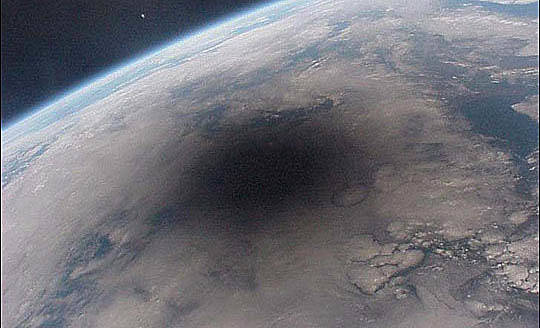
NASA published this original article by McKenzie Denton (KO4GLN) – a member of the Williamsburg Area Amateur Radio Club and the Long Island CW club – on September 25, 2023. Edits by EarthSky.
Do solar eclipses affect Earth’s atmosphere?
Solar eclipses can have a noticeable impact on the structure and dynamics of Earth’s upper atmosphere, the ionosphere. This is mainly due to the sudden drop in solar radiation reaching the Earth’s atmosphere during the eclipse. Since the ionosphere contains charged particles (ions and electrons) and is responsible for reflecting and refracting radio waves, changes to the ionosphere can also affect radio communications and navigation systems.
Read: Annular solar eclipse of October 14, 2023
Impacts on the ionosphere
Here’s how solar eclipses affect the structure and dynamics of Earth’s ionosphere:
Ionization changes: In the ionosphere, solar radiation is a primary source of ionization. Ionization is when an atom or molecule becomes charged while gaining or losing electrons. During a solar eclipse, less solar radiation leads to less ionization, especially 37 to 56 miles (60-90 km) up in the atmosphere. This decrease in ionization can cause a temporary drop in the density of electrons in the ionosphere.
Temperature changes: The drop in solar radiation during an eclipse can also lead to cooling of the upper atmosphere. This cooling can potentially cause changes in ionospheric densities and altitudes.
Electron density variations: The reduction in ionization and cooling during an eclipse can lead to a decrease in the electron density in the ionosphere. This can affect the propagation of radio waves, particularly in the high frequency, or HF, range. Radio waves use ionospheric reflection for long-distance communication.
Ionospheric anomalies: The sudden changes in ionospheric conditions during an eclipse can lead to the formation of ionospheric anomalies, such as holes or depletions. These anomalies can disrupt radio signals and GPS navigation systems, affecting communication and navigation over the affected regions.
Propagation effects: The altered ionospheric conditions during an eclipse can change how radio waves propagate through the ionosphere. This can cause signal fading, absorption and refraction, affecting shortwave and satellite communication systems.
What does this mean in layman’s terms?
Basically, the ionosphere – high up in Earth’s atmosphere – gets less sunlight and therefore cools during a total solar eclipse. This cooling can deplete some of the particles there, causing holes. Long-distance radio waves may not be able to bounce off the ionosphere in these regions to return their signals to Earth. In addition, other waves that pass through the ionosphere, like those used by GPS and communication satellites, are affected by the density change, which might cause disruptions.
But all these effects are only temporary and in the region where the eclipse is passing.
Solar eclipses are an opportunity for research
Solar eclipses provide a unique opportunity for researchers to study the ionosphere and its response to sudden changes in solar radiation. Scientists can use various instruments, such as ionosondes, GPS receivers and radar systems, to measure and monitor ionospheric variations during an eclipse. These studies will help improve our understanding of the ionosphere.
While solar eclipses can have noticeable effects on the ionosphere, they are generally temporary and localized to the region experiencing the eclipse. The ionosphere typically returns to its normal state after the eclipse event is over, and solar radiation levels return to normal.
If you’re interested in learning more about this topic, visit our website at https://hamsci.org/. HamSCI – the Ham Radio Science Citizen Investigation – furthers radio science with the help of amateur radio operators. HamSCI will host the Festivals of Eclipse Ionospheric Science in 2023 and 2024 to gather data for space physics research and help scientists understand how eclipses impact the ionosphere’s structure and dynamics.
Participation is open to volunteer amateur radio operators, short wave listeners, and scientific researchers.
Bottom line: Hear from a ham radio operator about how solar eclipses temporarily affect Earth’s upper atmosphere, or ionosphere. Eclipses can disrupt radio signals and GPS in the region where the eclipse is passing.
Read more: Total solar eclipse in North America April 8, 2024











